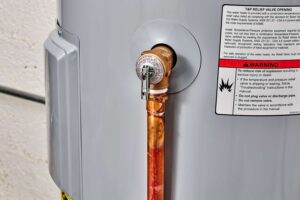If your kitchen sink is clogged, it's likely from grease, food scraps, coffee grounds, hair, or soap scum. You can fix it fast with easy solutions like plunging, using a plumbing snake, or a baking soda and vinegar mix. By identifying the blockage and choosing the right method, you can restore smooth drainage quickly.
Key Takeaways
- Avoid pouring grease down the sink to prevent solidification and blockages.
- Use a plunger or plumbing snake for quick DIY unclogging solutions.
- Try natural remedies like baking soda and vinegar to clear minor clogs gently.
- Place a sink strainer and run hot water regularly to prevent future clogs.
- Identify the blockage type and location before choosing the right unclogging method.
Common Causes of Kitchen Sink Clogs
If you frequently pour cooking grease down your kitchen sink, you are likely contributing to one of the most common causes of clogs. Grease may flow easily when hot, but as it cools, it solidifies, coating the pipes and trapping other debris that goes down the drain. Another common culprit is food scraps. Even small bits of food can accumulate over time, creating blockages that slow or stop the flow of water. Additionally, coffee grounds are often overlooked as a potential hazard. These seemingly harmless remnants can build up in the pipes, becoming a stubborn obstruction.
Hair is another major offender in sink clogs. Whether it's from shaving, washing your hair, or simply general shedding, hair can quickly amass in your drain, forming tangles that impede water flow. Soap scum, minerals, and other debris can also contribute to clogs, clinging to the pipes and creating a sticky barrier that catches other particles. By being mindful of what you allow down your sink, you can prevent many common causes of clogs and keep your kitchen running smoothly.
Identifying the Blockage in Your Sink
To identify the blockage in your sink, start by visually inspecting the drain for any visible debris or buildup. Check if there are food particles, grease, or soap scum accumulated near the opening of the drain. Use a flashlight if needed to get a clear view of the inside of the pipe. If the blockage is not visible from the surface, you may need to remove the stopper or strainer to look deeper into the drain.
Listen for any gurgling noises when the water is draining. These sounds could indicate the presence of a blockage further down the pipes. Additionally, if water is draining slowly or backing up in the sink, it is likely that there is a clog obstructing the flow.
Try running water and observing how it behaves in the sink. If the water pools or takes a long time to drain, this could point towards a blockage. By identifying these signs, you can determine the nature and location of the blockage, which will help you in choosing the right method to unclog your sink.
Quick DIY Solutions for Unclogging
When dealing with a kitchen sink clog, start by trying quick DIY solutions to unclog it efficiently. Here are three effective methods you can use to tackle the blockage:
- Plunging: Use a plunger designed for sinks to create a seal around the drain and push and pull to dislodge the clog. Make sure there is enough water in the sink to cover the plunger.
- Using a Plumbing Snake: A plumbing snake, also known as a drain auger, can reach deep into the pipes to break up and remove the clog. Insert the snake and twist it to hook onto the blockage, then pull it out.
- Baking Soda and Vinegar: Pour a mixture of baking soda and vinegar down the drain, followed by hot water. The fizzing action can help break down the clog, and the hot water flushes it away.
Using Natural Remedies to Clear the Drain
Consider using readily available household items to naturally clear your drain, effectively tackling minor clogs without harsh chemicals. One common natural remedy is a mixture of baking soda and vinegar. Start by pouring boiling water down the drain to loosen any greasy substances. Follow this with a cup of baking soda and then a mixture of one cup vinegar and one cup hot water. Cover the drain with a plug to contain the fizzing reaction that helps break down the clog. After 10-15 minutes, flush the drain with hot water. Another natural option is using salt and baking soda. Mix half a cup of each and pour it down the drain, followed by boiling water. The abrasive nature of this mixture can help dislodge debris. You can also try using a combination of lemon juice and vinegar. Pour a cup of each down the drain, let it sit for an hour, then flush with hot water. These natural remedies offer a gentle yet effective way to clear minor clogs in your kitchen sink.
Preventing Future Sink Clogs
Take proactive steps to avoid future sink clogs by implementing simple maintenance practices. Follow these tips to keep your kitchen sink running smoothly:
- Use a Sink Strainer: Place a sink strainer over the drain to catch food particles, debris, and other substances that could cause clogs. Empty the strainer regularly to prevent buildup.
- Avoid Pouring Grease Down the Drain: Grease can solidify in your pipes, leading to blockages. Dispose of grease by letting it solidify in a container and then throwing it in the trash.
- Run Hot Water After Each Use: After using the sink, run hot water for a few minutes to help flush away any residue that could potentially accumulate and cause a clog. Hot water can help keep oils and fats in a liquid state, preventing them from sticking to the pipes.
Seeking Professional Help When Needed
If you encounter persistent clogs despite preventive measures, it may be time to seek professional assistance for your kitchen sink. Professional plumbers have the expertise and tools necessary to tackle stubborn clogs that home remedies can't handle. They can use specialized equipment like drain snakes or hydro-jetting to clear out tough blockages efficiently.
When considering whether to call a professional, assess the severity of the clog. If you've tried DIY methods without success, it's best to leave it to the experts to prevent causing further damage to your pipes. Additionally, if you notice recurring clogs or slow drainage in multiple sinks in your home, it could indicate a more significant issue within your plumbing system that requires professional attention.
Hiring a professional plumber can save you time and frustration in dealing with persistent clogs. They can provide long-term solutions to keep your kitchen sink running smoothly, ensuring that you won't have to deal with frequent backups and clogs in the future.
Conclusion
Masterflo Plumbing is North Georgia's most trusted plumbing company. With over 20 years of experience and staffed with master plumbers, our team is equipped and ready to serve your plumbing needs. From water heater repair or replacement to minor and major plumbing problems, you can count on Masterflo Plumbing for your plumbing needs throughout Cherokee County and metro Atlanta.

